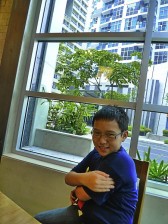11-year-old math whiz also plays the stock market

FARRELL Eldrian Wu reads the Inquirer business pages daily to check on the stock market. MIKO MORELOS
When he reads the morning papers, 11-year-old Farrell Eldrian Wu makes sure he doesn’t miss the business pages, paying particular attention to the daily stock market report.
Since he learned how to invest in the bourse, Farrell has been hooked, often spending his free time during a lull in computer classes in his school, checking developments on the trading floor via the Internet, said his mother Elaine.
Because of his extraordinary grasp of mathematics at a young age, Farrell has put some of his money in investments that have earned him modest profits.
The country’s youngest “mathlete” also showed off his prowess with numbers at the recently-concluded 14th Primary Mathematics World Contest in Hong Kong, bringing home the lone gold medal for the country last month.
The youngest of the 16-member Philippine team, Farrell and the Philippine contingent also garnered four silver and four bronze medals, as well as two merit citations in the competition organized by Po Leung Kuk, Hong Kong’s oldest social service organization.
Article continues after this advertisement“I had to stop him [from investing] for a year because it could affect his studies,” said Elaine, referring to the times Farrell used his free time in their computer classes to view the Philippine Stock Exchange website.
Article continues after this advertisementBut for Farrell, one must “read the news and look at the price history” of the shares before investing in the right companies.
Farrell had always been attracted to numbers. “When I was one and a half years old, I was drawn to figures,” he admitted.
The boy also learned to read when he was only “1.2 years old,” recalled Elaine.
“Mom, what do you mean by 1.2?” Farrell interjected. “1.2 years would be around one year and three months.”
When he was younger, Farrell would babble what Elaine said she would later learn as axioms.
One time, he told her that “an odd number plus another odd number would always be equal to an even number; an even number plus an even number would be equal to an even number, and an odd number plus an even number would be an odd number.”
“I should have taken down all the things he said, because there were a lot,” she says. “I told him that he should start writing his ideas down in a proof book.”
Farrell started competing in math contests three years ago when he was in third grade. He was eventually brought into the pool of “mathletes” by Mathematics Trainers’ Guild-Philippines, where he honed his skills.
In his spare time, the boy plays the piano and violin, keeps an iPad to entertain himself, and spends hours at bookstores scouring for more books to read.
And what he does he want to be when he’s done with school? “An investment banker, of course,” he said proudly.